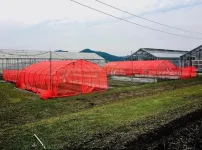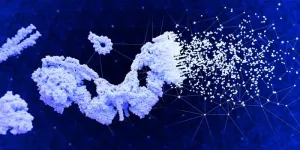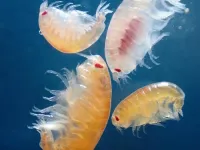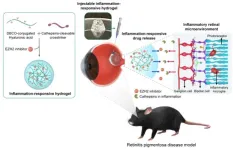(Press-News.org)
ANN ARBOR—Using social media data and artificial intelligence in a comprehensive national assessment, a new University of Michigan study reveals that nearly 15% of Americans deny that climate change is real.
Scientists have long warned that a warming climate will cause communities around the globe to face increasing risks due to unprecedented levels of flooding, wildfires, heat stress, sea-level rise and more. Though the science is sound—even showing that human-induced, climate-related natural disasters are growing in frequency and intensity sooner than originally anticipated—climate change is still not wholly accepted as true in the United States.
The researchers used Twitter (now X) data from 2017 to 2019 and AI techniques to understand how social media has spread climate change denialism, analyzing the data to estimate climate change belief and denial rates.
The study, scheduled for online publication Feb. 14 in the journal Scientific Reports, also identified key influencers, such as former President Donald Trump, and how they spread and cement misinformation about climate change by leveraging world and weather events.
"Prior to the advancement of AI and social media data, this work relied on expensive and time-consuming surveys," said study senior author Joshua Newell, professor and co-director of the Center for Sustainable Systems at U-M's School for Environment and Sustainability.
Using ChatGPT's Large Language Model, the researchers classified more than 7.4 million geocoded tweets as 'for' or 'against' climate change and mapped the results at state and county levels. They then used statistical models to determine the typical profile of someone who does not believe in climate change and performed network analysis to identify the structure of the social media network for both climate change belief and denial.
The study found that 14.8% of Americans deny that climate change is real, which is consistent with previous national studies, and also identified the demographic and geographic groups where denialism persists.
Analysis of the geocoded tweets revealed that belief in climate change is highest along the West Coast and East Coast, and that denialism is highest in the central and southern parts of the country, with more than 20% of the populations of Oklahoma, Mississippi, Alabama and North Dakota consisting of people who do not believe in climate change.
The researchers also revealed that belief in climate change can vary substantially within states. For example, in California, where less than 12% of the population does not believe in climate change, northern California's Shasta County had climate change denial rates as high as 52%.
Similarly, the average percentage of deniers in Texas is 21%, but at the county level, this ranges from 13% in Travis County to 67% in Hockley County.
The findings show that political affiliation plays the most influential role in determining whether a person believes in climate change or not, with a high percentage of Republican voters having the strongest correlation with climate change deniers.
In addition, the researchers saw a strong connection between climate denialism and low COVID-19 vaccination rates, suggesting a broad skepticism of science. Other variables that they found to influence climate change opinion include level of education, income and the degree to which the regional economy is reliant on fossil fuels to produce energy.
"What this indicates is that communities with a high prevalence of climate change deniers are at risk of discounting other science-based health or safety recommendations," said study lead author Dimitrios Gounaridis, a research fellow at U-M's Center for Sustainable Systems.
The study is also the first to identify which individuals on X are influential in shaping belief or denial of climate change and to what extent. In addition, it maps out how denialists and climate change believers have formed mostly separate X communities, creating echo chambers that do not interact with each other.
The findings show Trump as having the biggest influence, as well as three influential groups that heavily retweeted him—The Daily Wire, Breitbart and Climate Depot—in addition to conservative political commentators such as Ben Shapiro.
"During the 2017-2019 study period, the most heavily retweeted post includes one by Trump that questions climate change due to unusually cold weather in the U.S., and another where he casts doubt on a U.N. climate report," Newell said. "In almost half of the tweets analyzed, the most common refrain was that 'climate change was not real.'"
Other frequent explanations were that humans are not the primary cause and that climate change experts are unreliable.
Newell said that, although there's a broad awareness of the fact that social media users like Trump can be influential, it was striking just how influential a role some individuals play in shaping and cementing public opinion on crucial issues such as climate change.
"What is scary, and somewhat disheartening, is how divided the worlds are between climate change belief and denial," he said. "The respective X echo chambers have little communication and interaction between them."
Newell notes that the study did not analyze newer social media outlets, such as Truth Social, a primary channel for Trump's recent social media posts.
"Influencers like Trump are creating their own echo chambers outside of X, which in many ways is even more concerning," he said. "People tend to selectively credit or discredit evidence based on their beliefs, which is how fake experts come to serve as credible messengers.
"This is the basis of the theory of identity-protective cognition, which helps explain, for example, why Republican voters are more likely to believe tweets from Trump on climate change rather than other, more reliable sources—it is identity-affirming."
With election season in full swing, the study's authors suggest that social media companies should flag misinformation when it appears on their platforms and consider banning users who persistently spread falsehoods.
"The information revealed in this study provides a basis for developing strategies to counter this knowledge vulnerability and reduce the spread of mis- or disinformation by identifying the communities most at risk of not adopting measures to increase resilience to the effects of climate change," Newell said. "We learned that a relatively small number of individuals are highly influential in spreading misinformation about climate change.
"Social media companies have banned users for this type of behavior in the past, and for other topics, such as when then-Twitter banned Trump because of tweets maintaining election fraud and supporting the U.S. Capitol attack on Jan. 6 (his account has since been restored). For the safety of others, these companies should consider developing similar policies to limit the spread of climate change misinformation."
Study: The social anatomy of climate change denial in the United States
DOI 10.1038/s41598-023-50591-6 (available once embargo lifts)
Written by Nayiri Mullinix, U-M School for Environment and Sustainability
END
Nearly 15% of Americans deny climate change is real, AI study finds
Public figures such as Trump play outsized role in influencing beliefs
2024-02-14
ELSE PRESS RELEASES FROM THIS DATE:
Red nets signal “stop” to insect pests, reduce need for insecticides
2024-02-14
Red nets are better at keeping away a common agricultural insect pest than typical black or white nets, according to a new study. Researchers experimented with the effect of red, white, black and combination-colored nets on deterring onion thrips from eating Kujo leeks, also called Welsh onions. In both lab and field tests, red nets were significantly better at deterring the insect than other colors. Also, in field tests, onion crops which were either partially or fully covered by red netting required 25-50% less insecticide than was needed for a totally uncovered field. Changing agricultural nets from black or white to red could help reduce pesticide ...
AI tool predicts function of unknown proteins
2024-02-14
A new artificial intelligence (AI) tool that draws logical inferences about the function of unknown proteins promises to help scientists unravel the inner workings of the cell.
Developed by KAUST bioinformatics researcher Maxat Kulmanov and colleagues, the tool outperforms existing analytical methods for forecasting protein functions and is even able to analyze proteins with no clear matches in existing datasets[1].
The model, termed DeepGO-SE, takes advantage of large language models similar to those ...
Promising new therapeutic approach for treating metastatic pancreatic cancer
2024-02-14
A research paper published today (14 February 2024) in Nature Cancer details new insights into the role of efferocytosis – the burying of dead cells – in pancreatic cancer that spreads to the liver.
Liver metastasis occurs in 40–50% of people with pancreatic ductal adenosarcoma (PDAC), and there are currently no effective therapies to cure pancreatic cancer patients that have liver metastasis.
Led by University of Liverpool’s Professor Michael Schmid and colleagues, this study found PDAC metastases to show high levels of immunosuppressive macrophages, a type of white blood ...
Neuronal insights: flash and freeze-fracture
2024-02-14
Fear and addiction exert significant influence within society. Managing them is often challenging, as they are driven by intricate neuronal circuits in our brains. Understanding the underlying molecular mechanisms is crucial to intervene when these processes malfunction. Pioneered by scientists at the Institute of Science and Technology Austria (ISTA), the novel “Flash and Freeze-fracture” technique provides a unique glimpse into the respective brain region. The results were recently published in the journal PNAS.
While looking for food, a bird encounters a fox. It gets away just in time, but the sight ...
Tiny crustaceans discovered preying on live jellyfish during harsh Arctic night
2024-02-14
In the dark and cold of the months-long polar night, food resources are limited. Some groups of marine organisms in the polar regions overcome this challenge by going into a metabolic resting state in winter, surviving on reserves accumulated during the short growth season. But others, such as several species of marine zooplankton, have evolved a different strategy: they shift from a specialized to an omnivorous diet during the polar night, profiting from a wide range of potentially less rewarding foods that are available throughout the year.
Now, ...
It's award season: let's celebrate microbes in movies
2024-02-14
Elche (Spain), January 22, 2024. Usually, show business depicts viruses, bacteria, and other microorganisms as one of the worst menaces to humankind. Entertainment movies influence the way audiences understand and perceive these topics. Yet, few films accurately portray the science of microbiology and its social implications. Movies and TV series often feature outbreaks of deadly diseases and the efforts of scientists and medical professionals to contain them. However, entertainment movies can also educate the public about the importance and the impact ...
New treatment developed to dramatically slow down the progression of blindness-causing retinal diseases
2024-02-14
The Korea Institute of Science and Technology (KIST) announced that Dr. Maesoon Im of the Brain Science Institute, together with Prof. Seung Ja Oh of Kyung Hee University and Prof. Kangwon Lee of Seoul National University, successfully incorporated anti-inflammatory drugs into a hydrogel to suppress inflammation in the retina and effectively deliver the drugs to the inflamed area.
Age-related macular degeneration and retinitis pigmentosa are incurable eye diseases that cause blindness due to the gradual damage of photoreceptor cells, which convert light into biological signals in the retina, the light-sensitive tissue at the back of the eye. Age-related macular degeneration is a condition ...
Menopause and migraines: New findings point to power of prevention
2024-02-14
For middle-aged women plagued by migraines, or hot flashes and night sweats, another worry may linger in the backs of their minds: whether these experiences have set them up for a heart attack, a stroke or another cardiovascular crisis.
After all, past research suggesting such a link during and after menopause has gotten a lot of attention.
But a pair of new studies in the journal Menopause suggest that most of them don’t need to worry as much, especially if they don’t have both migraines and long-term hot flashes and night sweats.
Instead, they should focus on tackling the ...
The combination of migraine and persistent hot flashes could prove deadly
2024-02-14
CLEVELAND, Ohio (Feb 14, 2024)—Hot flashes and migraine (particularly with aura) have been shown to be individual risk factors for cardiovascular disease because of associated poorer heart disease riskfactor profiles. A new study, however, is the first to examine the joint influences of migraine and hot flashes/night sweats (vasomotor symptoms) independent of traditional heart disease risk factors and estrogen use. Research results are published online today in Menopause, the journal of The Menopause Society.
Specifically, ...
Acupuncture may curb heightened risk of stroke associated with rheumatoid arthritis
2024-02-14
A course of acupuncture may curb the heightened risk of stroke associated with rheumatoid arthritis, finds a comparative study published in the open access journal BMJ Open.
The effects seem to be independent of sex, age, medication use, and co-existing conditions, the findings indicate, prompting the researchers to suggest that the procedure may reduce levels of pro-inflammatory proteins (cytokines) in the body that are linked to cardiovascular disease.
The principal cause of death in people with rheumatoid arthritis is cardiovascular disease. And they are more likely to have a stroke than ...
LAST 30 PRESS RELEASES:
Start school later, sleep longer, learn better
Many nations underestimate greenhouse emissions from wastewater systems, but the lapse is fixable
The Lancet: New weight loss pill leads to greater blood sugar control and weight loss for people with diabetes than current oral GLP-1, phase 3 trial finds
Pediatric investigation study highlights two-way association between teen fitness and confidence
Researchers develop cognitive tool kit enabling early Alzheimer's detection in Mandarin Chinese
New book captures hidden toll of immigration enforcement on families
New record: Laser cuts bone deeper than before
Heart attack deaths rose between 2011 and 2022 among adults younger than age 55
Will melting glaciers slow climate change? A prevailing theory is on shaky ground
New treatment may dramatically improve survival for those with deadly brain cancer
Here we grow: chondrocytes’ behavior reveals novel targets for bone growth disorders
Leaping puddles create new rules for water physics
Scientists identify key protein that stops malaria parasite growth
Wildfire smoke linked to rise in violent assaults, new 11-year study finds
New technology could use sunlight to break down ‘forever chemicals’
Green hydrogen without forever chemicals and iridium
Billion-DKK grant for research in green transformation of the built environment
For solar power to truly provide affordable energy access, we need to deploy it better
Middle-aged men are most vulnerable to faster aging due to ‘forever chemicals’
Starving cancer: Nutrient deprivation effects on synovial sarcoma
Speaking from the heart: Study identifies key concerns of parenting with an early-onset cardiovascular condition
From the Late Bronze Age to today - Old Irish Goat carries 3,000 years of Irish history
Emerging class of antibiotics to tackle global tuberculosis crisis
Researchers create distortion-resistant energy materials to improve lithium-ion batteries
Scientists create the most detailed molecular map to date of the developing Down syndrome brain
Nutrient uptake gets to the root of roots
Aspirin not a quick fix for preventing bowel cancer
HPV vaccination provides “sustained protection” against cervical cancer
Many post-authorization studies fail to comply with public disclosure rules
GLP-1 drugs combined with healthy lifestyle habits linked with reduced cardiovascular risk among diabetes patients
[Press-News.org] Nearly 15% of Americans deny climate change is real, AI study findsPublic figures such as Trump play outsized role in influencing beliefs





